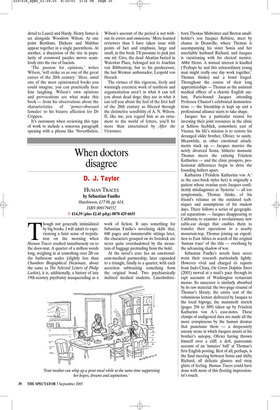When doctors disagree
D. J. Taylor
HUMAN TRACES by Sebastian Faulks Hutchinson, £17.99, pp. 614, ISBN 0091794552 ✆ £14.39 (plus £2.45 p&p) 0870 429 6655 Though not generally intimidated by big books, I will admit to experiencing a faint sense of trepidation on the morning when Human Traces crashed tumultuously on to the door-mat. A quarter of a million words long, weighing in at something over 2lb on the bathroom scales (slightly less than Chambers Biographical Dictionary, about the same as The Selected Letters of Philip Larkin), it is, additionally, a history of late 19th-century psychiatry masquerading as a work of fiction. It says something for Sebastian Faulks’s novelising skills that, 600 pages and innumerable sittings later, the characters grouped on its foredeck are never quite overshadowed by the mountain of baggage protruding from the hold.
At the novel’s core lies an emotionalcum-medical partnership, later expanded to a triangle, finally to a quartet, with each accretion subtracting something from the original bond. Two psychiatrically inclined medical students, Lincolnshire born Thomas Midwinter and Breton smallholder’s son Jacques Rebière, meet by chance in Deauville, where Thomas is accompanying his sister Sonia and her unreliable husband Richard, and Jacques is vacationing with his clerical mentor, Abbé Henri. A mutual interest is kindled (‘Perhaps he and this extraordinary young man might really one day work together,’ Thomas thinks) and a bond forged. Throughout the course of their long apprenticeships — Thomas as the assistant medical officer of a chaotic English asylum, Paris-bound Jacques attending Professor Charcot’s celebrated demonstrations — the friendship is kept up and a professional alliance starts to take shape.
Jacques has a particular reason for investing their joint resources in the clinic at Schloss Seeblick, somewhere east of Vienna: his life’s mission is to restore his deranged older brother, Olivier, to sanity. Meanwhile, as other emotional attachments stack up — Jacques marries the newly divorced Sonia; hitherto monastic Thomas meets the enticing Fräulein Katharina — and the clinic prospers, professional differences begin to drive the founding fathers apart.
Katharina (‘Fräulein Katharina von A.’ as the case-book styles her) is originally a patient whose ovarian cysts Jacques confidently misdiagnoses as ‘hysteria’ — all too symptomatic, Thomas thinks, of his friend’s reliance on the outdated techniques and assumptions of his student days. There follows a series of geographical separations — Jacques disappearing to California to examine a revolutionary new cable-car design that enables them to transfer their operations to a nearby mountain-top, Thomas joining an expedition to East Africa in search of the original ‘human trace’ of the title — overhung by the advancing shadow of war.
Sebastian Faulks’s novels have never worn their research particularly lightly. However vivid and charged its reports from Indo-China, On Green Dolphin Street (2001) moved at a snail’s pace through its rapt accounts of Washington restaurant menus. Its successor is similarly absorbed by its raw material: the two-page résumé of Thomas’s library; the entire text of the voluminous lecture delivered by Jacques to the local bigwigs; the mammoth stretch (pages 294 to 309) taken up by Fräulein Katharina von A.’s case-notes. These clumps of undigested data are made all the more conspicuous by the human dramas that punctuate them — a desperately uneasy scene in which Jacques assists at his brother’s autopsy, Olivier having thrown himself over a cliff; a deft, panoramic account of an ‘inmates’ ball’ at Thomas’s first English posting. Best of all, perhaps, is the final meeting between Sonia and shifty Richard, all delicate glances and stray glints of feeling. Human Traces could have done with more of this fleeting impressionist’s touch.









































 Previous page
Previous page